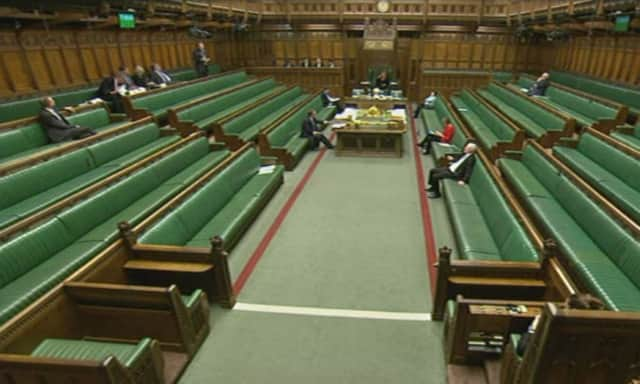Referendum on ‘white elephant’ HS2 would let government ‘off the hook’


Christopher Chope MP, who put the proposal forward, said a national referendum – and HS2’s likely rejection by voters – would enable the Conservatives, Labour and Lib Dems to drop their support for the £50bn project, without them having to make an embarassing U-turn on policy.
The Tory MP for Christchurch in Dorset – which is no-where near the proposed line – said: “When the people have spoken in a referendum it allows the front benches to let themselves off the hook without any humiliation.”
Advertisement
Hide AdAdvertisement
Hide AdHe said people across the country deserved the chance to decide whether one of the biggest infrastructure project in UK history, which costs £51m per constituency, goes ahead.
During today’s debate he told the Commons, which only had a dozen or so MPs present: “Throughout our history people have spent money on vanity projects, follies and white elephants.
“I have no problem with that provided the money is their own and not taxpayers’.
He said HS2, which would cut through Aylesbury Vale, came from New Labour and unfortunately the Tory leadership had been ‘seduced’ by it.
Advertisement
Hide AdAdvertisement
Hide AdHe added that the ‘sales pitch’ for HS2 has changed repeatedly and that the Common’s public account committee said only last week that it was ‘sceptical’ about whether the scheme would deliver value for taxpayers.
“A remarkable feature is that we started with the announcement that it would cost £16bn in 2009 and currently we’re on a final figure of £50bn.”
Dominic Grieve, the Conservative MP for Beaconsfield who left the cabinet in July 2014 – giving him ‘greater scope’ to express his views – backed the referendum.
He said it would force the scheme’s promoters to be completely open with its business case and costs, which were currently ‘hanging in the air’.
Advertisement
Hide AdAdvertisement
Hide AdFrank Dobson, the Labour MP for Holborn and St Pancras in London, said HS2 had been ‘drawn up on a fag packet’.
He said he was not a fan of referendums, but that ‘my opposition to referendums is slight compared to my opposition to the ludicrous HS2 scheme which is both amateurish and exceedingly expensive’.
He added: “It is unpopular in every part of England and even more unpopular in Scotland and Wales.”
Amersham MP Cheryl Gillan said David Lidington – who was not present for the debate – had asked her to put on record his Aylesbury constituency’s ‘very strong feelings’ about the scheme.
Advertisement
Hide AdAdvertisement
Hide AdShe added: “This is not a project which has captured the imagination up and down the country. The trouble is it is slipping under the radar in many ways.”
Minister of state for transport, John Hayes said the government did not support Mr Chope’s private members bill.
“The core of the bill is a proposal that a project – in this case HS2 but it actually could be any large infrastructure project – should only proceed with further reference to the British people. That’s a suggestion I flatly disagree with and it is flatly opposed by the government.”
He quoted 18th century statesman Edmund Burke, who said: “Your representative owes you, not his industry only, but his judgment; and he betrays instead of serving you if he sacrifices it to your opinion.”
Advertisement
Hide AdAdvertisement
Hide AdHe said the country’s Victorian leaders who were responsible for some of our greatest infrastructure projects did not resort to referendums – and that many of the criticisms of HS2 were the same as those who opposed the very first railways.
Mr Chope said his bill had no chance of getting through before the end of Parliament and therefore it was withdrawn. However, he hoped a similar bill would be passed by parliament after the general election.
Fridays are generally used by MPs to visit their constituencies – hence why there was a particularly poor turnout for the debate.